Experienced Manhattan DWI Lawyer
- 24/7 – Free attorney consultation
- Flat fee rates
- Hundreds of 5-star reviews
- Payment plans are available and credit cards accepted
- Trust our history of massive wins in state and federal court
Don’t waste time anxiously searching online to find out what will happen with your case and if you will have a criminal record or worse, have to serve jail time. You can be on the phone with an attorney who will lay everything out for you in minutes.
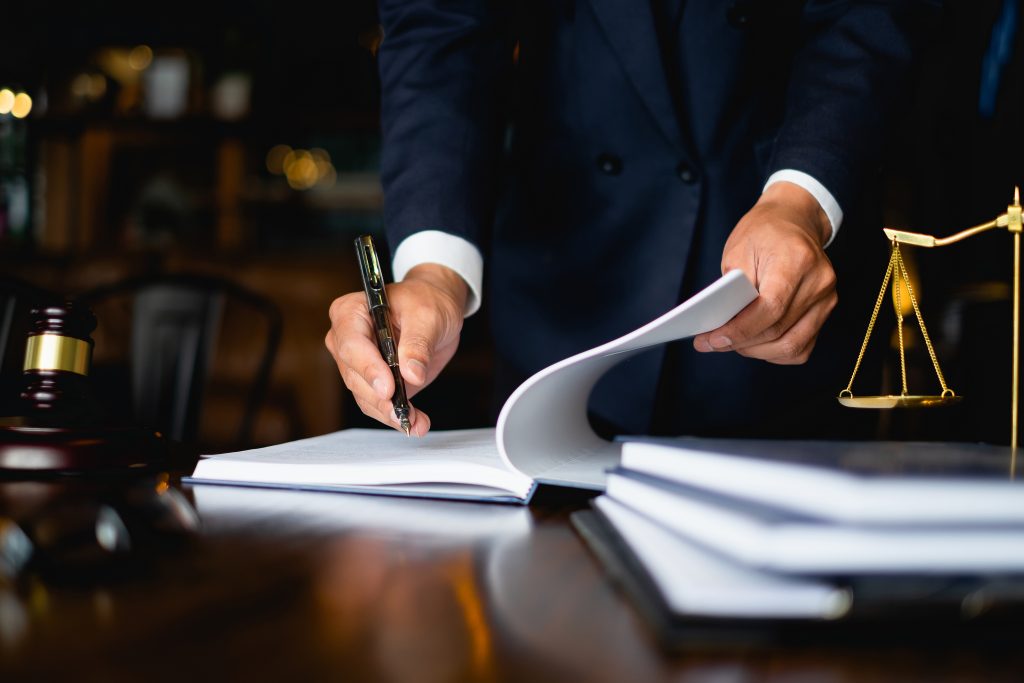
Thousands of misdemeanor and felony cases resolved with no criminal record for our clients.
Over a hundred years of legal experience.
Manhattan DWI Lawyer – Lebedin Kofman LLP | NYC DWI Lawyers – DUI Attorneys – Criminal Defense Lawyers
In many cases, an individual who has been charged with a DWI has had no previous exposure to the criminal justice system. But alcohol-related offenses are taken very seriously in the state of New York and can result in a criminal record that can follow you for the rest of your life. Don’t face the system alone. Let us help.
At Lebedin Kofman LLP, experienced Manhattan DWI lawyer Russ Kofman and our team of Nassau County and Manhattan are dedicated to providing the highest quality of legal defense possible and to diligently fighting for the rights of our clients. From the moment you are charged with a DWI or other alcohol or drug-related offense, we are right there in your corner, helping protect your legal rights and ensure the best possible legal outcome for your case.
Call us today at (646) 663-4430 to schedule a free consultation with a skilled DWI lawyer.
What Types of DWI Charges Are There in New York?
New York State enforces strict blood alcohol content (BAC) limits for drivers. For most drivers, the legal BAC limit is 0.08%. However, for commercial drivers, the limit is set at 0.04%, and for drivers under the age of 21, any BAC higher than 0.02% can lead to a DWI charge due to the Zero Tolerance Law. These limits are consistent in New York including Manhattan and Nassau County, reflecting the state’s commitment to reducing impaired driving and enhancing road safety.
Defining DWI: Insights from a New York DWI Lawyer
In New York, Driving While Intoxicated (DWI) is defined as operating a motor vehicle with a BAC of 0.08% or higher. More severe charges, such as Aggravated DWI, may apply if a driver’s BAC is 0.18% or above. A DWI Lawyer would emphasize that a DWI charge can result from impairment by alcohol or drugs, including prescription and over-the-counter medications that affect one’s ability to drive.
There are distinct differences in our drunk driving charges, and they are dependent on specific factors surrounding the circumstances:
- DWI or driving while intoxicated – In New York, a person who is caught operating a motor vehicle with a blood alcohol concentration of 0.08% or more can be charged with the misdemeanor of DWI. If that individual has received another DWI within the past ten years, they may be facing a felony charge.
- Aggravated DWI – An individual who is caught operating a motor vehicle with a blood alcohol concentration of 0.18% or higher may be charged with aggravated DWI.
- DWAI, or driving while ability impaired – An individual who is caught operating a motor vehicle with a blood alcohol concentration of between 0.05% and 0.08% may be charged with a DWAI. While this is not a criminal charge, penalties can include both fines and jail time.
- DWAI-Drugs – An individual who is caught operating a motor vehicle under the influence of drugs may be charged with a DWAI-Drugs.
- DWAI-Combination – An individual who is caught operating a motor vehicle under the influence of both alcohol and drugs may be charged with a DWAI-Combination.
New York also has zero-tolerance laws for drivers under the age of 21. These laws make it unlawful for a young driver to drive with a blood alcohol concentration as low as 0.02%.
Implied Consent Laws and DWI Arrests
New York’s Implied Consent Law states that by driving on state roads, drivers have consented to chemical testing if they are arrested for a suspected DWI. This can include breath, blood, urine, or saliva testing. Refusal to submit to such tests in Manhattan or Nassau County will result in an immediate suspension of the driver’s license, and can lead to additional penalties beyond those associated with a DWI conviction. It is critical for drivers to be aware of these laws, as the implications of refusal can be as significant as the DWI charge itself.
The Importance of Hiring a DWI Lawyer
When faced with a DWI charge in Manhattan, the expertise of a seasoned DWI lawyer is invaluable. The complexities of New York’s legal system demand a professional
who not only understands the letter of the law but is also adept at navigating the local legal landscape. Hiring a lawyer with specific local experience can make a
significant difference in the outcome of a DWI case.
Extensive Knowledge of New York DWI Laws
A DWI lawyer practicing in New York brings a depth of knowledge about specific DWI laws that apply to the borough. This includes familiarity with the local courts, judges, and district attorneys, which can be leveraged to the client’s advantage. The lawyer’s understanding extends to the nuances of New York’s DWI laws, from the permissible evidence in DWI cases to sentencing guidelines and potential loopholes.
Protecting Your Rights and Interests: Lebedin Kofman LLP
At Lebedin Kofman LLP, the importance of protecting the rights and interests of our clients cannot be overstated. We are committed to ensuring that clients are treated fairly throughout the legal process and that their rights are preserved. Our team works diligently to ensure that every avenue for defense is explored and that clients receive a robust representation. This commitment extends to investigating the legality of traffic stops, the accuracy of BAC testing procedures, and the overall integrity of the evidence presented against our clients.
Manhattan DWI Attorney Russ Kofman Explains Leandra’s Law
Under the stipulations of Leandra’s Law, or the Child Protection Act, stringent consequences are in place for individuals convicted of driving while impaired with a passenger under 16 years of age.
Leandra’s Law delineates that an individual accused of driving under the influence and consequently injuring a minor may face a Class C felony charge, carrying a potential sentence of up to 15 years’ incarceration. Should such an incident tragically result in the fatality of a child, the driver could be subject to a Class B felony charge, with penalties extending up to 25 years in prison.
At Lebedin Kofman LLP, we uphold the principle that robust legal representation is a fundamental right for all individuals. Our team, including New York DUI attorney Russ Kofman, brings empathy and unwavering commitment to the defense of those confronted with DWI or DUI allegations in New York.
We invite you to reach out to us at (646) 663-4430 or (516) 212-4209 for a consultation with an adept DWI attorney who can provide the guidance and advocacy necessary during such challenging times.
Our Process
Our Firm Is Your Solution
The attorney will call you to discuss your case, defenses, and possible outcomes.
You will be told the fee right away, as well as, potentially available payment plans and financing options.
You will have the option of coming into our office to discuss further or we email you a retainer agreement and we can handle everything right from your phone without the need to go anywhere.

What Happens When You Are Pulled Over for a DWI or DUI?
If a police officer has observed driving behavior that seems to indicate possible intoxication, such as speeding, swerving, running traffic lights, or otherwise driving erratically, the officer may pull the driver over to further observe the driver’s behavior or appearance. Based on this observation, the officer may test the physical coordination of the driver through a series of field sobriety tests. Failure to perform at a given level will be an indication of intoxication.
An officer may also ask the driver to take a roadside breathalyzer test. The results of this test will be used as probable cause for an arrest, and another test will be given to the driver at the police station.
Criminal defense lawyer Russ Kofman and our team of DWI attorneys at Lebedin Kofman LLP understand the complexities surrounding a DWI charge. We know that facing the legal justice system may be tough, so our lawyers work hard for every case they handle. If you or a loved one is accused of drunk driving, our attorneys at Lebedin Kofman LLP may be able to help.
General Information
- What is a DWI in the state of New York?
- What are the misconceptions about arrest and prosecution for DWI?
- What are the mistakes people make after being arrested?
- What happens after the arrest?
- What are the ramifications of just pleading guilty?
- Is the driver’s license taken immediately and are there hardship licenses?
- How can refusing the breath or blood test affect license suspension?
- Do laws in New York address BAC levels below 0.08?
- What factors might enhance or aggravate a DWI charge?
- Are DWI cases involving illegal or prescription drugs common?
- Are there alternative programs for first-time offenders?
As members of the National College of DWI Defense, our attorneys can tirelessly fight for you in pursuit of the best results. We handle DWI/DUI cases from arraignment through trial, if necessary. We always work to accomplish the best results for our clients. These cases involve intricacies that require a special knowledge base, and that is exactly why we hone our DWI defense skills regularly. You can rely on our DWI attorneys in Manhattan and Nassau County to provide you with the effective and dedicated representation you deserve.
Contact Lebedin Kofman LLP today for your free consultation from a New York DWI defense attorney.
Vehicular Crimes
- Aggravated driving while intoxicated per se
- Aggravated driving while intoxicated with a child
- Driving while ability impaired by alcohol
- Driving while intoxicated per se
- Installation and operation of ignition interlock devices
- Leaving the scene of an incident without reporting
- Reckless driving
- Unlicensed operation of a motor vehicle
DWI Video FAQs
- What is a DWI?
- Why should people never admit to the police about drinking alcohol?
- What happens in refusing the breath test?
- What are the strict penalties for DUI?
- How can hiring an attorney affect the outcome of a DUI case?
Can You Refuse a Breathalyzer in NYC?
In New York, the act of obtaining a driver’s license carries with it an automatic agreement to submit to chemical testing, a provision known as “implied consent.” Should a driver choose to decline such testing, they face immediate suspension and potential revocation of their license. Additionally, the refusal to undergo a breathalyzer test may be introduced as evidence in a court of law.
Even without breathalyzer results, law enforcement officials can proceed with an arrest and the pursuit of charges based on alternative evidence of intoxication.
This evidence can include:
- Observations made by the responding police officer
- Performance on field sobriety and coordination tests, often captured on video
- Patterns of driving that suggest impairment
- The driver’s physical appearance and behavior during the traffic stop, such as slurred speech or red, watery eyes
- The scent of alcohol or marijuana emanating from the vehicle
- Details pertaining to any accidents that might have occurred
These elements collectively enable prosecutors to build a case for intoxication charges despite a driver’s refusal to submit to a breathalyzer test.

Different Types of Field Sobriety Testing
for DUI in New York
After a traffic stop, police officers in most states (including New York) administer field sobriety tests. Field sobriety tests aim to evaluate the balance and ability to focus of a person being suspected of drunk driving. The National Highway Traffic and Safety Administration has approved three standardized field sobriety tests.
After a traffic stop, police officers in most states (including New York) administer field sobriety tests. Field sobriety tests aim to evaluate the balance and ability to focus of a person being suspected of drunk driving. The National Highway Traffic and Safety Administration has approved three standardized field sobriety tests.
These tests include:
- The Walk and Turn Test – this is a test that requires the suspect to walk from heel to tip in a straight line. The suspect will then move backward on one foot and then turn on the other. The suspect will then walk backward and turn on one foot.
- Horizontal Gaze Nystagmus – In this test, officers will ask the suspect if he can visually follow a pen or another object. Officers will search for the exaggerated eye-jerking that can occur when an individual is under the influence. One challenge for this type of test is when the driver suffers from an eye condition that causes the same eye-jerking reaction.
- The One-Leg Stand – In this test, a police officer will ask the person to stand on one foot for a couple of seconds. If the person is not able to hold their balance, it can be a sign of intoxication. However, individuals with physical disabilities can be falsely accused of DWI based on this test.
If you or a loved one is facing DWI charges, it is important to seek the help of an experienced lawyer right away. A skilled attorney may be able to help you create a solid defense for your DWI charge and help you preserve your freedom.
What Elements Must Be Proven in a New York City DWI Case?
In the context of a New York City DWI case, the burden is on the prosecution to establish certain key elements beyond a reasonable doubt for a conviction.
These are:
- Vehicle Operation: The individual accused must be shown to have been in control of the vehicle. In New York law, control does not strictly mean driving; an individual can be deemed to be operating a vehicle if they are in the driver’s seat and have the capability to set the vehicle in motion.
Influence of Substances: There must be evidence indicating that the individual was under the influence of alcohol and/or drugs at the time they were operating the vehicle.
Proof of Operating the Vehicle
The definition of ‘operation’ under New York statutes extends beyond the actual motion of the vehicle. An individual is considered to be operating the vehicle if they are positioned behind the wheel with the intention to drive. This means a charge of DWI can be brought against an individual even if they are stationary. The prosecution’s task is to demonstrate the intent to operate, regardless of whether the vehicle’s engine was running.
Navigating these legal intricacies requires the expertise of a seasoned New York DWI attorney. Russ Kofman, alongside our proficient legal team, is well-versed in the complexities of DWI laws and is committed to advocating for the rights and freedoms of our clients. Confronting the legal system can be daunting, and securing experienced representation is a critical step for those charged with DWI offenses.
For a complimentary consultation, please contact us at (646) 663-4430 or (516) 212-4209. Our team is ready to provide the necessary legal support and guidance.
Proof of Influence of Substances
The next thing the prosecution must prove is the use of alcohol or drugs by the defendant. This proof will depend upon the charge. In the case of a per se DWI charge, the actual amount of alcohol or drugs in the defendant’s system must be proven, generally using chemical testing.
In a driving while intoxicated charge, the prosecution doesn’t need to prove the level of alcohol or drugs. It must merely be established that the individual was not capable of operating the vehicle safely. This can be done with a field sobriety test, the defendant’s behavior and speech at the time of a stop, the presence of alcohol in the vehicle, or even the odor of alcohol.
Penalties and Consequences for DWI Offenses
Facing a DWI charge in New York can lead to serious penalties and long-term consequences. Understanding the range of potential penalties is critical for those accused of DWI offenses in Manhattan and New York City. The implications of a conviction go beyond just legal sanctions; they can affect an individual’s personal and professional life for years to come.
Fines and Financial Impact in DWI Cases
In Manhattan and NYC, DWI convictions come with substantial fines that vary depending on the severity of the offense. For a first-time DWI offense, fines can range from $500 to $1,000, but these amounts can increase significantly with higher BAC levels or subsequent offenses. It is also important to note that convicted individuals often face additional financial burdens beyond the imposed fines, including increased insurance premiums, legal fees, and potential costs associated with mandated DWI education programs or treatment.
Driver's License Suspension and Revocation
One of the most immediate concerns for those charged with a DWI in Manhattan or Nassau County is the potential loss of driving privileges. New York law mandates license suspension for drivers convicted of DWI, with the period of suspension varying based on factors such as prior offenses and the specific details of the current charge. A first-time DWI typically results in a minimum six-month license suspension, while repeat offenders or those with higher BAC levels may face longer suspensions or even permanent revocation of their driver’s license. The impact of such penalties is profound, affecting an individual’s ability to commute to work, fulfill family obligations, and maintain independence.
Ignition Interlock Device Requirements
For those convicted of DWI, the court may require the installation of an ignition interlock device (IID) on any vehicle the offender operates. This device prevents the vehicle from starting if it detects alcohol on the driver’s breath. The requirement for an IID is often mandated for a period determined by the court and comes at the expense of the convicted individual, adding another layer of financial and personal consequence to the DWI conviction. Compliance with IID requirements is closely monitored, and any violation can lead to further legal penalties and an extension of the IID period.
When you have been charged with an alcohol-related offense in New York, getting skilled legal assistance can help mitigate your charges and potential penalties. At Lebedin Kofman, LLC, criminal defense attorney Russ Kofman and our experienced team of New York DWI attorneys are there to diligently represent your rights and ease the outcome of your charges.
DWI Defense Strategies for Manhattan and New York City
Navigating a DWI charge in New York requires a strategic and informed defense to effectively challenge the prosecution’s case. An experienced DWI attorney can deploy a variety of defense strategies tailored to the specifics of each case, leveraging a deep understanding of the law to protect clients’ rights and aim for the best possible outcome.
Challenging Breathalyzer Results: Strategies from Lebedin Kofman LLP
At Lebedin Kofman LLP, we understand that breathalyzer results are not infallible. Our strategies in challenging these results include scrutinizing the maintenance and calibration records of the breathalyzer device, the qualifications and actions of the administering officer, and the conditions under which the test was conducted. We also consider physiological factors that may affect BAC readings, such as medical conditions or diet, to ensure that the results are accurate and reliable.
Field Sobriety Tests: Understanding Limitations and Defenses
Field sobriety tests (FSTs) are a common tool used by law enforcement in Manhattan and Nassau County to assess impairment. However, these tests have inherent limitations and can be prone to error. Factors such as uneven road surfaces, weather conditions, and the subject’s physical condition can all affect FST performance. An adept DWI defense attorney will examine these tests’ administration and the officer’s interpretation of the results, providing a critical analysis that may undermine the evidence’s credibility.
Questioning Probable Cause for Traffic Stops
A fundamental aspect of any DWI defense is the evaluation of the initial traffic stop. Law enforcement must have probable cause to stop a vehicle. Without it, any evidence gathered during the stop may be inadmissible in court. By thoroughly investigating the circumstances leading to the stop, a skilled attorney can question whether the officer had a valid reason to initiate the encounter, potentially leading to the suppression of evidence and weakening the prosecution’s case.
How To Get a DWI Dismissed in NY?
To achieve a dismissal of DWI charges, defense attorneys typically employ one of three fundamental categories of arguments:
- Legal Insufficiency: The charges may be inadmissible because they don’t meet legal standards or criteria for prosecution.
- Insufficient Evidence: The evidence presented by the prosecution may not be compelling enough to substantiate the charges against the driver.
- Procedural Misconduct: Any errors in the legal process could render the case invalid.
Before a trial for a DWI offense can commence, the state is required to clear an initial legal hurdle. The court must be satisfied that there is adequate evidence to suggest that, should the prosecution present its case in full and the defense offer no counterarguments, a conviction would be possible. This is a basic filter to ensure the court’s time is not expended on a trial unlikely to yield a conviction.
In practice, defense lawyers may argue that the state has failed to demonstrate guilt beyond a reasonable doubt or that the proceedings against their client are fundamentally flawed or unjust. These tactics are directed at one or more of the above categories, aiming to prevent the case from proceeding to trial or to secure an acquittal for the client.
Our RSS Feed
Manhattan DWI Lawyer Lebedin Kofman LLP
With offices in Manhattan and Garden City, Nassau County, New York, Lebedin Kofman LLP is a law firm that is committed to defending individuals accused of criminal offenses, including complex DWI cases. Our mission is to secure positive results for our clients by providing effective legal representation and guiding them through the legal process.
 |
Predatory Sexual Assault in New YorkWhen prosecutors in New York decide to charge someone with predatory sexual assault, they’re essentially saying “we’re throwing the book at you.” This isn’t your run-of-the-mill sex crime charge. We’re talking about the most serious sexual offense in the state’s criminal code, with penalties that can literally put you away for life. If you’re facing […] |
Manhattan DWI Lawyer – Google Drive - Manhattan DWI Lawyer Lebedin Kofman LLP
Based in Manhattan, we at Lebedin Kofman LLP work tirelessly to represent those accused of criminal offenses, such as DWI. We remain steadfast in our commitment to assist individuals faced with these charges, safeguarding their rights and freedoms.
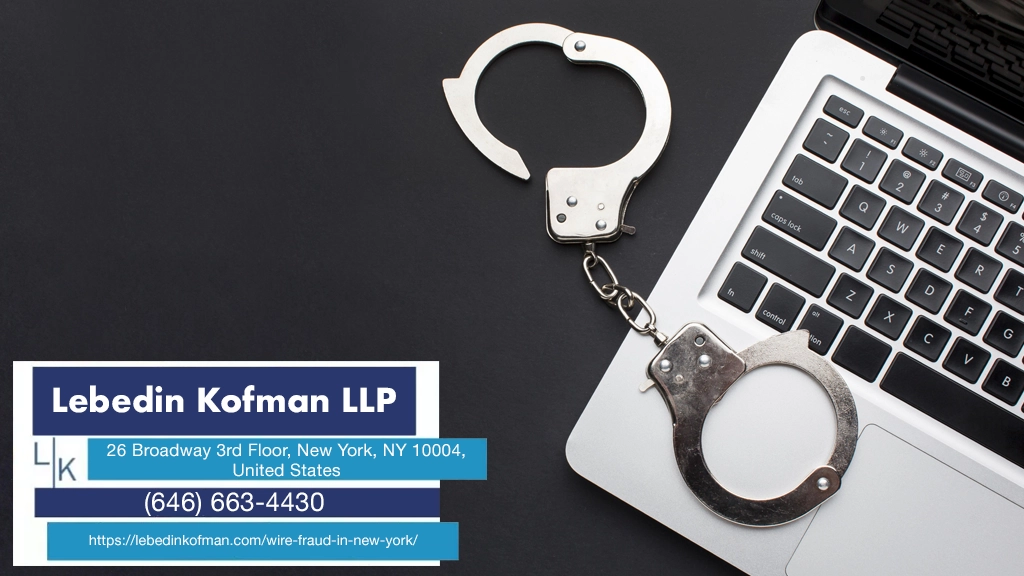 |
Wire Fraud in New York: When Digital Communications Become Federal CrimesWire fraud might sound like something out of a 1980s movie about hackers, but it’s actually one of the most serious federal crimes you can face in New York. Every day, federal prosecutors in Manhattan and Brooklyn are building cases against people who thought they were just sending emails, making phone calls, or conducting business […] |
Experienced Manhattan DWI Lawyer | Lebedin Kofman LLP | NYC DWI Lawyers | DUI Attorneys |Criminal Defense LawyersSpeak to the experienced Manhattan DWI lawyers at Lebedin Kofman LLP today if you are facing DWI charges. Free Consultation: (646) 663-4430. |
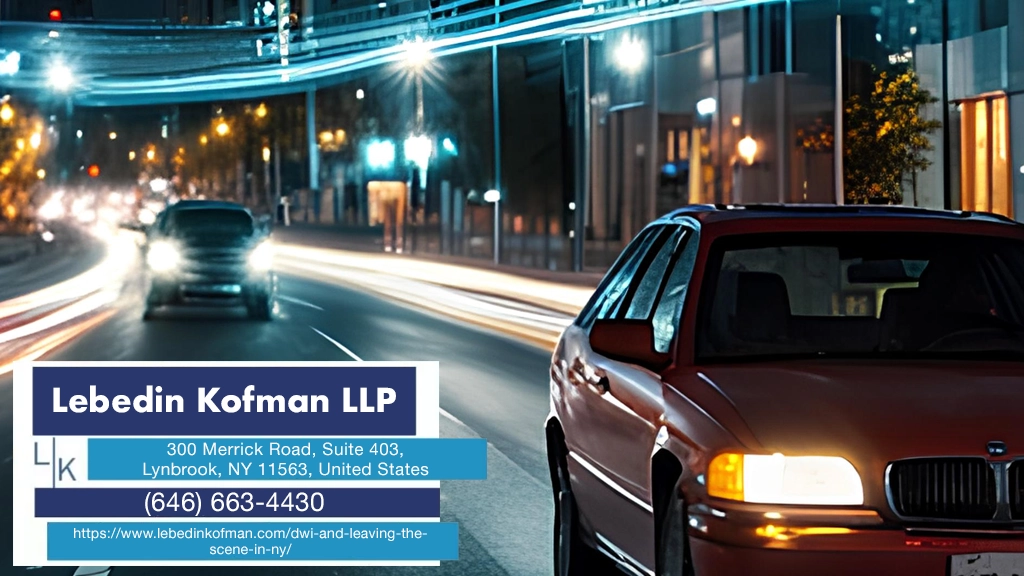 |
DWI and Leaving the Scene in New York: When Bad Decisions Become FeloniesYou’ve had a few drinks, you’re driving home, and suddenly you hear that sickening crunch of metal on metal. Your first instinct might be to panic and drive away, hoping nobody saw what happened. That split-second decision to flee the scene just turned your misdemeanor DWI into a potential felony nightmare that could land you […] |
Manhattan DWI Lawyer – Google My Maps - Manhattan DWI Lawyer Lebedin Kofman LLPLebedin Kofman LLP, a Manhattan-based firm, is dedicated to defending those charged with criminal offenses, including DWI. We stand firmly in our commitment to protect the rights and freedoms of individuals facing these charges. |
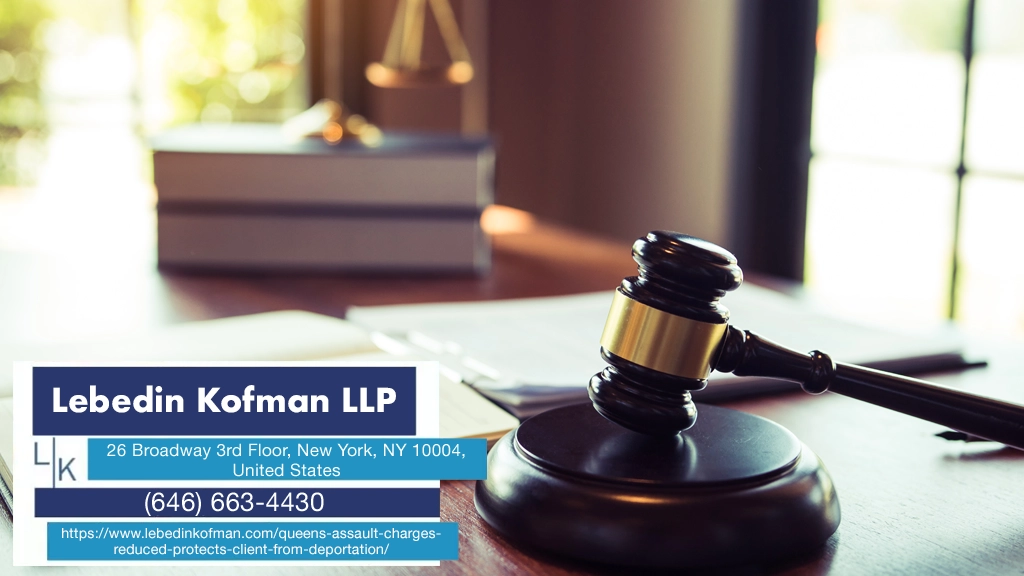 |
Queens Assault Charges Reduced: Lebedin Kofman LLP Secures Probation and Protects Client from DeportationSerious Assault Charges in Queens, NY At Lebedin Kofman LLP, our defense team represented a client charged with multiple violent assault felonies and misdemeanors in Queens County Criminal Court, including: The prosecution alleged that during a drunken altercation with her boyfriend, she slashed him across the forehead, causing heavy bleeding, stitches, and scarring. The Challenge: […] |
Proxi Map - Manhattan DWI Lawyer Lebedin Kofman LLP
Our team at Lebedin Kofman LLP, located in Manhattan, works hard to defend individuals charged with criminal offenses, including those related to drunk driving and DWI. We are unwavering in our pledge to help those accused while protecting their rights and freedoms.
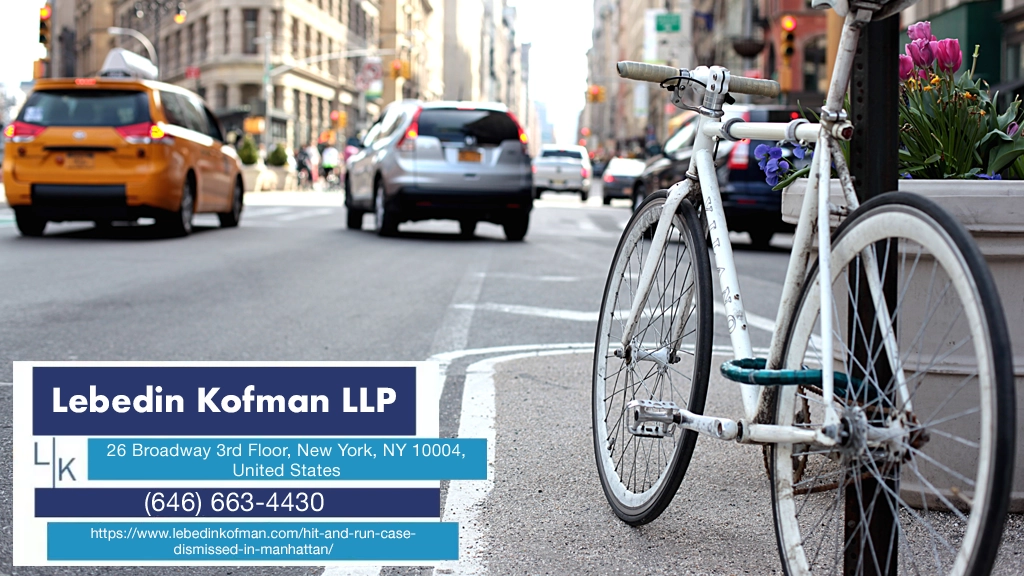 |
Hit-and-Run Case Dismissed in Manhattan: Lebedin Kofman LLP Secures Full Dismissal Despite Video EvidenceManhattan Hit-and-Run Dismissed: A Hard-Fought Victory At Lebedin Kofman LLP, our criminal defense attorneys recently represented a client charged in New York County (Manhattan) with Leaving the Scene of an Accident Without Reporting (VTL § 600), commonly known as a hit-and-run. The allegations were serious: prosecutors claimed our client, while driving a commercial work truck, […] |
 |
Manhattan DWI Lawyer - Lebedin Kofman LLP - (646) 663-4430 - Manhattan DWI Lawyer Lebedin Kofman LLPAt Lebedin Kofman LLP, a Manhattan-based law firm, our attorneys work diligently to advocate for the rights of those accused of crimes, including drunk driving offenses and DWI. We persist in our mission to aid individuals dealing with these charges, upholding their rights and freedoms. |
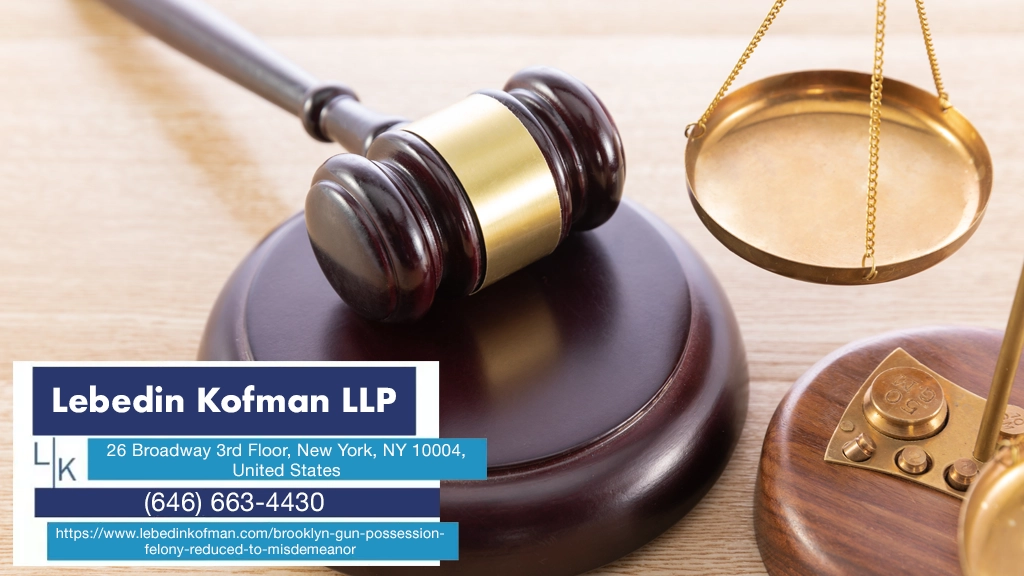 |
Brooklyn Gun Possession Felony Reduced to MisdemeanorBrooklyn Gun Possession Case: A Year-Old Felony Resolved At Lebedin Kofman LLP, our criminal defense team recently represented a client in Kings County (Brooklyn) who was charged with Criminal Possession of a Weapon under New York Penal Law § 265.03 and related statutes. The case had been pending for over a year, and the client […] |
Google Earth - Manhattan DWI Lawyer Lebedin Kofman LLP
Located in Manhattan, our team at Lebedin Kofman LLP is committed to defending those accused of crimes, including DWI charges. We stand unwavering in our dedication to protecting the rights and freedoms of individuals facing these charges.
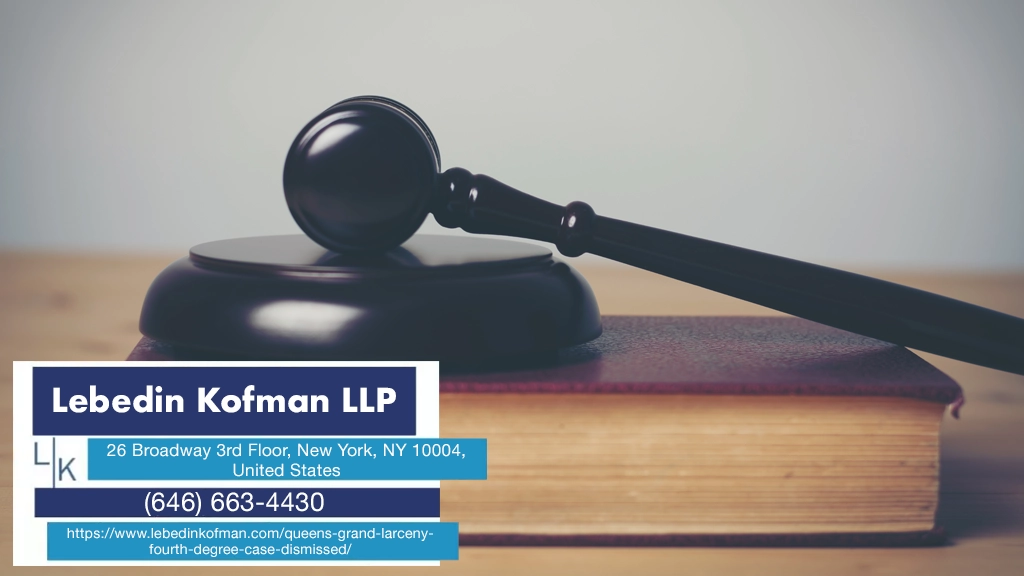 |
Queens Grand Larceny in the Fourth Degree Case Dismissed in Two WeeksA Rapid Dismissal for a Queens TLC Driver At Lebedin Kofman LLP, our criminal defense attorneys recently represented a TLC driver in Queens who was charged with Grand Larceny in the Fourth Degree (NY Penal Law § 155.30), a felony offense. Our client was desperate. TLC regulations prohibit licensed drivers from working while facing an […] |
Lebedin Kofman LLP | Criminal Attorney and DWI Lawyer - Google Suche - Manhattan DWI Lawyer Lebedin Kofman LLP
A law firm based in Manhattan, Lebedin Kofman LLP works hard to represent the rights of individuals charged with criminal offenses, including DWI. We persist in our commitment to provide quality legal representation to individuals dealing with these charges, protecting their rights and freedoms.
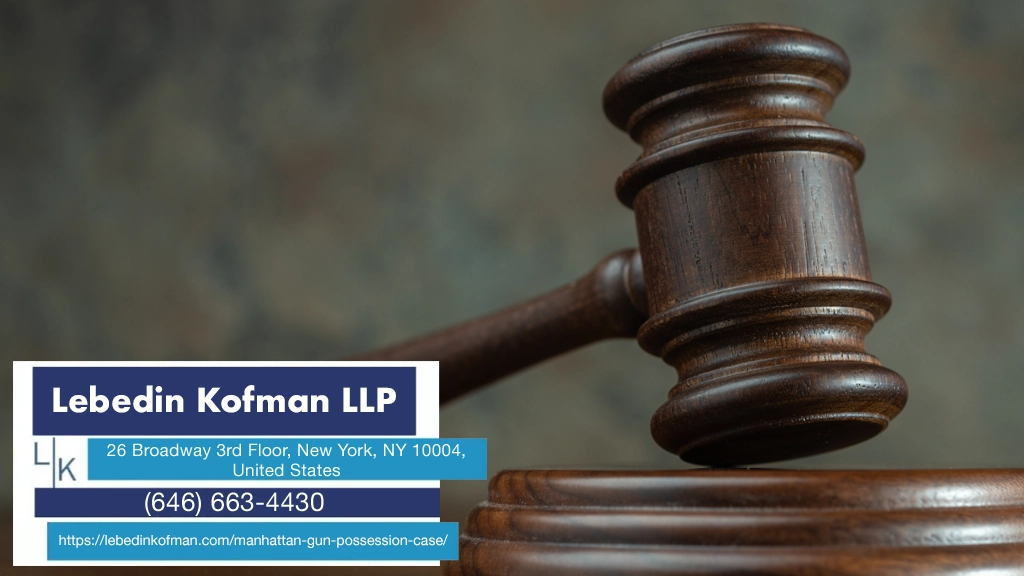 |
Manhattan Gun Possession Case Dismissed: Lebedin Kofman Secures Victory in New York Firearms DefenseUnderstanding the Case: Out-of-State Firearms in New York City At Lebedin Kofman LLP, our criminal defense team recently secured a major victory in New York County (Manhattan). Our client was arrested after a detective allegedly observed him adjusting a firearm on his belt before entering his vehicle. During a subsequent search, officers recovered: Although our […] |
Google Scholar - Manhattan DWI Lawyer Lebedin Kofman LLP
We at Lebedin Kofman LLP, situated in Manhattan, strive to defend those accused of criminal offenses, including situations involving DWI. We remain unyielding in our dedication to assisting individuals faced with these charges while upholding their rights and liberties.
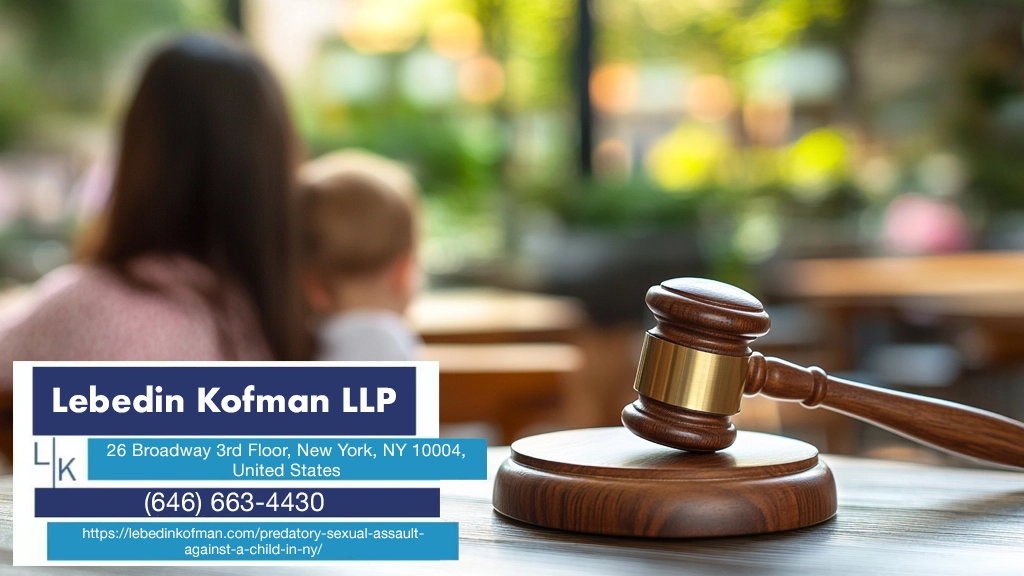 |
Predatory Sexual Assault Against a Child in New YorkWhen New York prosecutors charge someone with predatory sexual assault against a child, they’re pulling out the biggest gun in their arsenal. This isn’t just another sex crime charge. We’re talking about the most serious sexual offense in the state’s criminal code, carrying potential life imprisonment and consequences that will follow you for the rest […] |
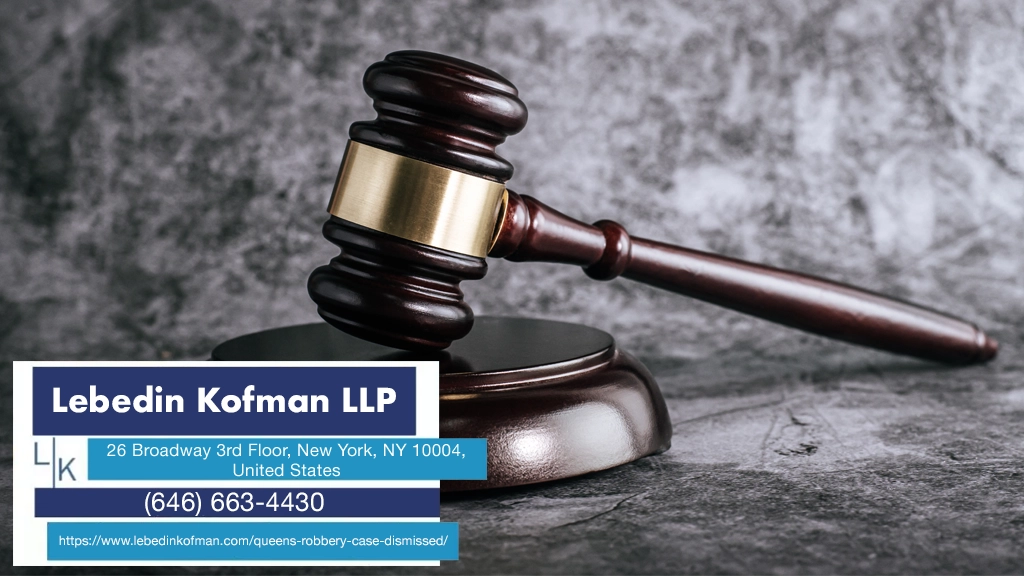 |
Queens Robbery Case Dismissed: Lebedin Kofman LLP Secures Non-Criminal ResolutionRobbery Charges in Queens: A Serious Threat Our team at Lebedin Kofman LLP recently represented a client in Queens County who was charged with Robbery in the Second Degree, a violent felony under New York Penal Law § 160.10. The stakes were extremely high: Background of the Case Our client, a Spanish-speaking individual with no […] |
News Category
Legal >> DUI AttorneysFeed Tags
- Manhattan DWI defense law
- Drunk driving charges in New York City
- Manhattan DWI law
- DWI charges in New York
- DUI Law in New York City
- New York City DUI defense
- Drunk driving law NYC
- Drunk driving defense in Manhattan
- DWI Defense in Manhattan
- DWI violations in NYC
- Drunk driving law in Manhattan
- Manhattan drunk driving law
- Manhattan
- New York
- Lebedin Kofman LLP
- Manhattan DWI Lawyer
All feed content copyright their respective owners. Use of links to and summaries of content by this site in rss curation falls under fair use for the purpose of reporting and commentary.
Aggressive DWI Representation at Your Service: Call Lebedin Kofman LLP Today
A DWI incident can transpire under the most unexpected circumstances. Even a modest consumption of alcohol could impair your ability to operate a vehicle, potentially leading to a DWI arrest should you find yourself unable to drive safely, such as at a stoplight. DWI arrests can result from various scenarios, ranging from routine traffic stops to systematic sobriety checkpoints.
In the face of DWI allegations within NYC or Manhattan, the seasoned legal team at Lebedin Kofman LLP is your strategic ally. Our adept DWI lawyers are tailored to safeguard your liberties with a robust and assertive defense. We are committed to dissecting the complexities of your case and mobilizing a tenacious legal front. Elevate your defense with Lebedin Kofman LLP – where your rights are our priority, and yo
Client Reviews



Highly recommended!





He was patient, understanding and clear and set my mind at ease about the entire situation. His team has been excellent in helping settle debts for substantially less than owed and have been an invaluable resource when it comes to helping get my financial house in order.
I would not hesitate to hire Arthur again and will do so if the need arises in the future.



Do not hesitate to call this firm because they will be right by your side every step of the way. They surely live up to their great reviews.




Let’s Talk
Your Defense Starts Now.
26 Broadway, 3rd FL
New York, NY 10004
646-663-4430